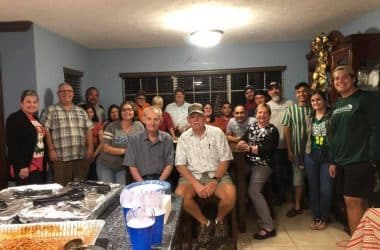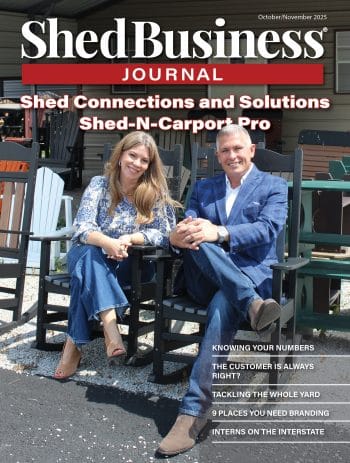Shed Companies Find Benefits and Challenges in Being ‘Solutions Oriented’

Shed companies are going beyond mere sheds these days and taking a more diversified approach to their product inventory. In return, they’re often getting a more stable business model that can more readily weather the up and down cycles of individual products.
Some view themselves more as backyard consultants than retailers, as they seek to find comprehensive solutions for their customers while building long-term, sometimes generational, relationships. While others stop short of calling themselves consultants, they offer a more diversified lineup, nonetheless, selling such wide-ranging products as decks, fencing, dog houses, playground equipment, and even chicken coops.
SELLING A SOLUTION
Perhaps no one knows how to diversify a product line as much as Nelson Lafayette, CEO of Best in Backyards. The outdoor superstore, with locations scattered across Connecticut and New York, was founded by Scott Honigsberg some 30 years ago as a builder of swing sets, then later added sheds to their product line.
In the years that followed, each time a customer would ask them to consider selling another backyard product, they would often add it to their lineup. Today, they serve as both retailer and consultant by guiding customers through the process of building out their backyard spaces—from evaluating their site survey to ensuring they’re not in violation of city ordinances to helping them with the permitting process.
Often, customers will come in with a blank canvas with only a few vague ideas. Best in Backyards’ design team will show them renderings and help generate ideas for what they can do.
“We put the ideas and concepts together internally as we talk to our customers, depending on their needs, and we go through a process,” Lafayette says. “We spend our time trying to understand what they have in mind, what their requirements are and any ideas they may already have.”
The Best in Backyards team strives to earn a customer’s trust along the way and build relationships that last for years or decades. They currently have an active database of 22,000 customers and interact with them weekly or monthly through emails.
They’ll also introduce new products based upon direct interactions with customers and monitor email “open rates” and “click rates” to determine which products get the most traction.
“Right now, we are bringing in a new line of outdoor saunas, which is something that our customers have been talking to us about,” he says.
Of course, Best in Backyards’ unique business model hasn’t happened overnight.
“It’s taken us 35 years to get to this point,” Lafayette says. “There are some folks that have attempted to do what we do, but there’s a very high barrier … and it takes time.”
The biggest advantage to their unique approach is that profit margins for individual items don’t matter as much because a business owner can get more creative in their sales packaging.
“We can do a bundle special, where they can get a certain amount of a product for ‘X’ off and we’ll charge you half for installation,” he says. “If I look at it separately, you’ll see profit margin erosion; but by having the bundle I may be able to offset that with higher sales.
“It doesn’t necessarily work all the time, but we have a very good idea of the profitability per product and that helps us with putting these solutions together.”
Lafayette does face some challenges. For example, developing and training staff capable of advising customers on such a wide variety of products can be difficult.
“From the perspective of human capital, it is extremely difficult to train folks to operate well at that level because there’s a big difference between selling a product and selling a solution,” he points out.
WEATHERING THE UPS AND DOWNS
Gary Jackson, president/owner of Apex Shed Company in Springville, Utah, stops short of saying he offers “total backyard solutions,” but he has unquestionably become more diversified over the years. His biggest seller after sheds? Chicken coops.
“I have a large family and my kids growing up wanted chickens,” Jackson says, “so I gave them some materials and they built their own chicken coops. Later, I designed and built something real nice that everybody just loved, so I put a picture of it on our website, and we started selling them.”
He was surprised by how much people are willing to spend on their coops (which are essentially retrofitted sheds). In fact, they currently bring in the highest profit margin of anything Apex Shed Company sells—some 7 to 8 percentage points higher than sheds.
“We’re doing five or six of them a week now,” he adds. “It’s a niche that’s really worked well for us.”
They’ve also added greenhouses, dog houses, and loafing sheds for livestock.
“We have found a clientele that loves them,” he adds, “and in our area of the world there is not much competition for those types of things.”
Many times, a shed company’s product line is dictated by geography. For Zachary Redder, general sales manager of North Country Storage (NCS) Barns in Philadelphia, New York, sheds are still his company’s bread and butter, but outdoor “poly” furniture is a close second. The company is situated near the Thousand Islands area at Lake Ontario and many customers need deck furniture for their cabin or lake house.
While Redder doesn’t offer “total backyard solutions,” he comes close. NCS Barns’ moderately diverse product line also includes outdoor gazebos, pavilions, chicken coops, hunting blinds, and play sets, as well as rustic Amish indoor furniture. They also operate a large 2,000-square-foot showroom for their sheds and other items.
“We keep a stocked showroom at our Philadelphia and Sandy Creek locations,” Redder says. “There are little bird feeders, rocking chairs, wishing wells, windmills … all kinds of things.”
He says being diversified can soften the blow of market fluctuations.
“There’s a lot of competition, so it’s important to pay attention,” Redder says. “When I started here, we began looking for other things that we could try and see how they sell.”
Often, NCS will bring a new product into the store for a week to test the market.
“It’s important to be open to change because that’s what the market’s going to do,” he adds. “It’s never going to stay the same, so you have to keep up with the times a little.”
Apart from the financial benefits, diversification can also be a rewarding experience for the seller.
“You’re going to meet a hundred different types of customers,” Redder says. “Being able to help every single customer with their unique needs is quite rewarding. We have a little saying here—‘We have something for everyone’—and I believe that we do. “Recently, we had a customer who was so excited to buy a chicken coop, and being able to have that option for them was truly special.”



